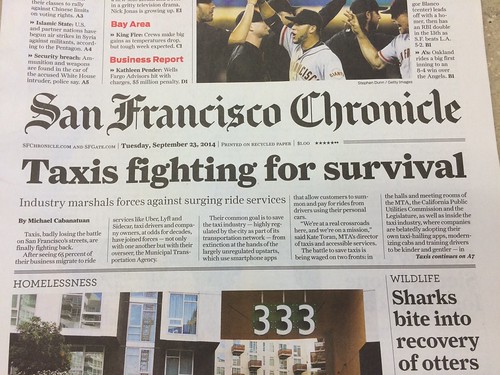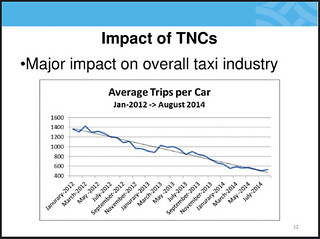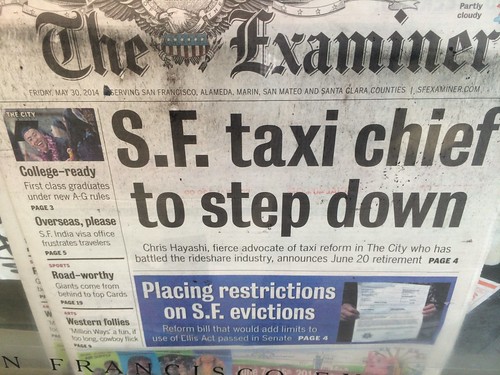
(Above: Read the full article in the SF Chronicle, and, please, read the comments. There’s no mercy for the taxi industry from former customers. Here are my recommendations to the taxi industry to lead this movement not fight it)
The Collaborative Economy is a crowd commerce revolution.
People are empowered to get what they need from each other, using now common, mobile technologies in their pockets. Several quarters ago, people told me it was a fad; it wouldn’t last; peer-to-peer commerce can’t happen at scale. Like social media was disbelieved in 2005 (I vividly remember the attack of the blogs), we’re seeing disruptions, but these impact real revenues, not just communications.

Above Graphic: A TNC (Transportation Network Company) is the designation for Sidecar, Uber, and Lyft. From SF Municipal Transportation Agency, SF Examiner.
Yesterday, at newsstands across the San Francisco Bay area and online (my pic, above), it was reported that taxis are suffering a 65% loss in rides two thirds of their revenue lost in less than 3 years. It’s not limited to San Francisco. DC taxis are down 22% and a once dominant taxi cab company says they have less than 18 months of life left. A recent study by Boston University shows that, for every 1% growth of Airbnb, hotels are impacted half a percent and Airbnb is growing at an incredible rate. How fast? Uber’s revenues are doubling every six months, and Lending Club, where people lend to each other instead of going to banks, is having hockey-stick like growth, having brokered $5 billion worth of loans in five years.
The startups are heavily funded in every industry.
Investors are funneling incredible amounts of money into this market: $2.7 billion in just under the last ten months (see spreadsheet), with Google being a leading investor in the market. It’s not limited to cars and homes and dollars. The Collaborative Economy is impacting many industries, including food, business services, retail, business space, and more. You can see the Honeycomb Framework to see how goods, food, services, transportation, space, and money are each impacted. The next version of the honeycomb infographic will include health, utilities, education, and more.
Progressive corporations augment their business model to partner with the crowd.
It’s important that you prepare your company for these changes now. People are empowered to get what they need from each other. The crowd is becoming like a company. The good news is that companies can use these same technologies and strategies. Ford has provided special cars to Lyft drivers, Hyatt has partnered with Uber for instant bookings using an API, Whole Foods has partnered with Instacart for crowd-based, home deliveries, and Verizon has enabled sharing of many objects using their vast network. (Disclosure: The above companies are members of my company, Crowd Companies)

Taxi chief steps down, article suggests no relation to ride sharing: “It’s not,” she added, “because Travis has kicked my ass.” —read article. For context, Travis is Uber’s CEO
If you work for or with large companies, access the Body of Work in the Collaborative Economy and discover how other companies are crowd-proofing by joining this movement.
Good piece. Let’s not overlook one underrated issue which is that it’s simply nicer to ride in an amateur’s clean sedan than in a pro’s unappealing taxi. OTOH, Uber may seriously undermine their reputation with crazy peak pricing strategies.
Thanks Rusty, good thoughts. It’s a different experience. Riders can vote off poor cars, and drivers. It’s so simple, it’s free market capitalism. As you wisely point out, that free market pricing also cause strive with surge pricing.
What about Uber movements inside organizations? In a collaborative workplace, function and silos may become obsolete as employees have tool to get around them
That’s a great point. On a related note, there’s already enterprise software that’s replicated Uber for corporations, internally. See
https://www.getlocalmotion.com
Great recap Jeremiah. This is a people-powered movement and there’s no stopping it. The fight will get nasty as communities large and small weigh-in on the values of regulations to ensure safety vs. the experience, novelty and trust associated with these new offerings. What will be interesting to see is when these orginal disruptors get distrupted.
Thanks Debbie, it’s also worth noting that the startups are hiring campaigners and former political advisors. Uber recently hired Obama’s top campaigner.
We need to be careful about how we use these terms, as it seems there is
more hype than economic realism. ‘Collaborative’ or even ‘sharing’
connote consensual and somewhat egalitarian methods for production and redistribution. Uber – the example featured here – is a derivative distribution model (a good one at that), but it is not actually peer-to-peer because it still acts as a clearinghouse and an intermediary, whereas a true P2P platform would enable drivers to build their own network hubs based on things like reputation or resource capability.
The terminology is the propaganda. Nobody wants to hear about a venture funded push into a highly regulated business. That sounds boring. “Sharing” sounds like something for hippies. “Peers” sounds better than “hustling gigs for billionaires.”
Ohio Taxis down 50% revenue: http://www.dispatch.com/content/stories/local/2014/10/13/uber-lyft-taking-bite-out-of-taxi-business.html